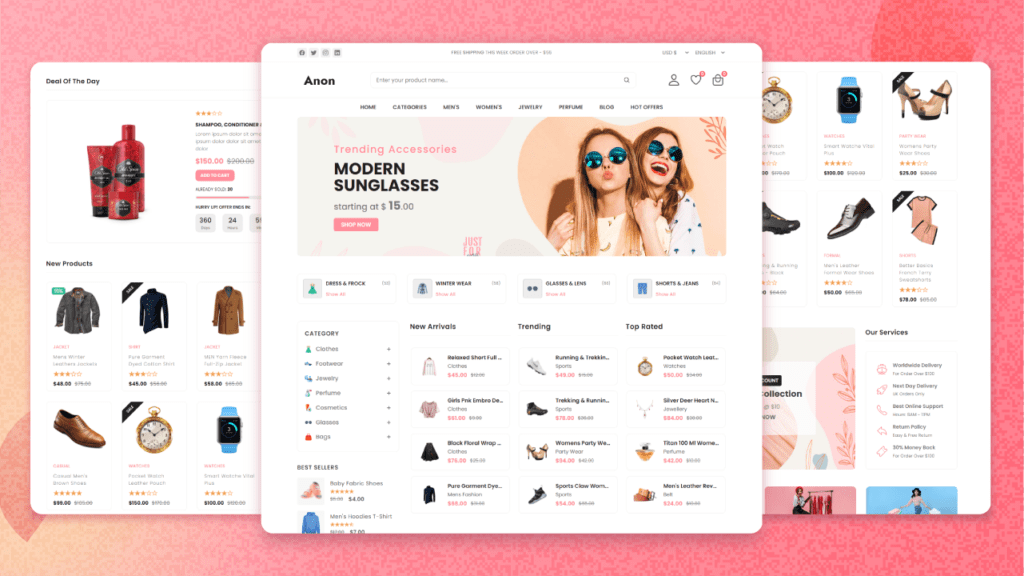Introduction of E-commerce Development
With the rapid growth of online shopping, building a high-converting online store is essential for business success. Whether you’re launching a new store or optimizing an existing one, the right E-commerce development strategy can make all the difference. In this guide, we’ll walk you through the key steps to create a powerful online store using platforms like Shopify & WooCommerce.
1. Choosing the Right E-commerce Platform
Selecting the right platform is the first step in E-commerce development. Two of the most popular choices are:
✅ Shopify – Best for beginners, offering an all-in-one solution with hosting, themes, and apps.
✅ WooCommerce – A flexible, WordPress-based plugin that allows full customization and control.
Which One to Choose?
| Feature | Shopify | WooCommerce Feature |
| Ease of Use | Easy, beginner-friendly | Requires WordPress knowledge |
| Customization | Limited without coding | Highly customizable |
| Pricing | Monthly subscription | Pay for hosting & plugins |
| Best For | Quick setup | Advanced customization |
If you need a hassle-free setup, Shopify is a great choice. If you want more control and flexibility, WooCommerce is ideal.

2. Designing a User-Friendly Online Store
A well-designed online store boosts conversions. Here’s how to create a seamless shopping experience:
✔ Mobile-First Design
- Over 70% of online shoppers use mobile devices.
- Choose a responsive theme that looks great on all devices.
✔ Fast Loading Speed
- Use lightweight themes and optimize images.
- Choose a reliable hosting provider for WooCommerce or use Shopify’s built-in hosting.
✔ Easy Navigation & Search
- Use clear categories and a powerful search bar.
- Add filters for price, brand, and product type.
✔ High-Quality Product Images & Descriptions
- Use multiple angles and zoom features for product images.
- Write clear, engaging product descriptions with key benefits.
3. Optimizing for High Conversion Rates
✔ Streamlined Checkout Process
- Offer guest checkout to reduce cart abandonment.
- Minimize steps and auto-fill options for faster checkout.
✔ Multiple Payment Options
- Accept credit cards, PayPal, Apple Pay, Google Pay, and BNPL (Buy Now, Pay Later) options.
✔ Trust Signals & Security
- Display SSL certificates, secure payment badges, and customer reviews.
- Offer clear refund and return policies.
✔ Cart Abandonment Recovery
- Send reminder emails or offer discounts to users who leave items in their cart.
- Use Shopify’s built-in cart recovery or WooCommerce plugins like Retainful.
4. SEO & Marketing Strategies for Your Online Store
✔ E-commerce SEO
- Optimize product pages with E-commerce development keywords.
- Write compelling meta descriptions and image alt texts.
✔ Social Media & Paid Ads
- Use Instagram, Facebook, and TikTok ads to drive traffic.
- Leverage influencer marketing for brand awareness.

✔ Email Marketing & Retargeting
- Send personalized email offers to repeat customers.
- Use retargeting ads to bring back potential buyers.
Conclusion about E-Commerce Development
Building a successful online store requires the right platform, user-friendly design, and strategic marketing. Whether you choose Shopify or WooCommerce, optimizing for conversions will drive more sales and revenue.
🚀 Need help with E-commerce development? Rajhans Digital Tech Agency specializes in designing and optimizing high-converting online stores. Contact us today!
